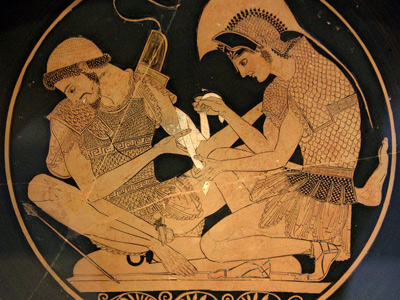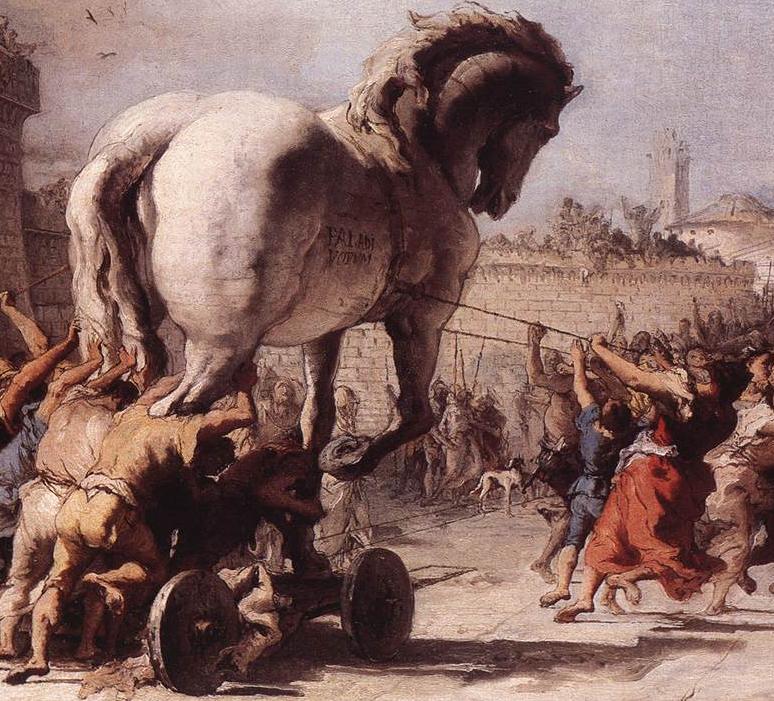Trojan War (1194–1184 BC)
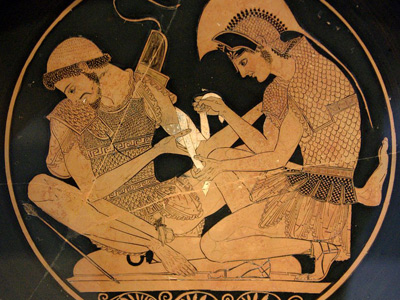
After the Iliad
Penthesilea and the death of Achilles
Shortly after the burial of Hector, Penthesilea, queen of the Amazons, arrived with her warriors. Penthesilea, daughter of Otrere and Ares, had accidentally killed her sister Hippolyte. She was purified from this action by Priam, and in exchange she fought for him and killed many, including Machaon (according to Pausanias, Machaon was killed by Eurypylus), and according to another version, Achilles himself, who was resurrected at the request of Thetis. Penthesilia was then killed by Achilles who fell in love with her beauty after her death. Thersites, a simple soldier and the ugliest Achaean, taunted Achilles over his love and gouged out Penthesilea's eyes. Achilles slew Thersites, and after a dispute sailed to Lesbos, where he was purified for his murder by Odysseus after sacrificing to Apollo, Artemis, and Leto.
While they were away, Memnon of Ethiopia, son of Tithonus and Eos, came with his host to help his stepbrother Priam. He did not come directly from Ethiopia, but either from Susa in Persia, conquering all the peoples in between, or from the Caucasus, leading an army of Ethiopians and Indians. Like Achilles, he wore armour made by Hephaestus. In the ensuing battle, Memnon killed Antilochus, who took one of Memnon's blows to save his father Nestor. Achilles and Memnon then fought. Zeus weighed the fate of the two heroes; the weight containing that of Memnon sank, and he was slain by Achilles. Achilles chased the Trojans to their city, which he entered. The gods, seeing that he had killed too many of their children, decided that it was his time to die. He was killed after Paris shot a poisoned arrow that was guided by Apollo. In another version he was killed by a knife to the back (or heel) by Paris, while marrying Polyxena, daughter of Priam, in the temple of Thymbraean Apollo, the site where he had earlier killed Troilus. Both versions conspicuously deny the killer any sort of valour, saying Achilles remained undefeated on the battlefield. His bones were mingled with those of Patroclus, and funeral games were held. Like Ajax, he is represented as living after his death in the island of Leuke, at the mouth of the Danube River, where he is married to Helen.
Judgment of Arms
A great battle raged around the dead Achilles. Ajax held back the Trojans, while Odysseus carried the body away. When Achilles' armour was offered to the smartest warrior, the two that had saved his body came forward as competitors. Agamemnon, unwilling to undertake the invidious duty of deciding between the two competitors, referred the dispute to the decision of the Trojan prisoners, inquiring of them which of the two heroes had done most harm to the Trojans. Alternatively, the Trojans and Pallas Athena were the judges in that, following Nestor's advice, spies were sent to the walls to overhear what was said. A girl said that Ajax was braver:
For Aias took up and carried out of the strife the hero, Peleus'
son: this great Odysseus cared not to do.
To this another replied by Athena's contrivance:
Why, what is this you say? A thing against reason and untrue!
Even a woman could carry a load once a man had put it on her
shoulder; but she could not fight. For she would fail with fear
if she should fight. (Scholiast on Aristophanes, Knights 1056 and Aristophanes ib)
According to Pindar, the decision was made by secret ballot among the Achaeans. In all story versions, the arms were awarded to Odysseus. Driven mad with grief, Ajax desired to kill his comrades, but Athena caused him to mistake the cattle and their herdsmen for the Achaean warriors. In his frenzy he scourged two rams, believing them to be Agamemnon and Menelaus. In the morning, he came to his senses and killed himself by jumping on the sword that had been given to him by Hector, so that it pierced his armpit, his only vulnerable part. According to an older tradition, he was killed by the Trojans who, seeing he was invulnerable, attacked him with clay until he was covered by it and could no longer move, thus dying of starvation.
Prophecies
After the tenth year, it was prophesied that Troy could not fall without Heracles' bow, which was with Philoctetes in Lemnos. Odysseus and Diomedes retrieved Philoctetes, whose wound had healed. Philoctetes then shot and killed Paris.
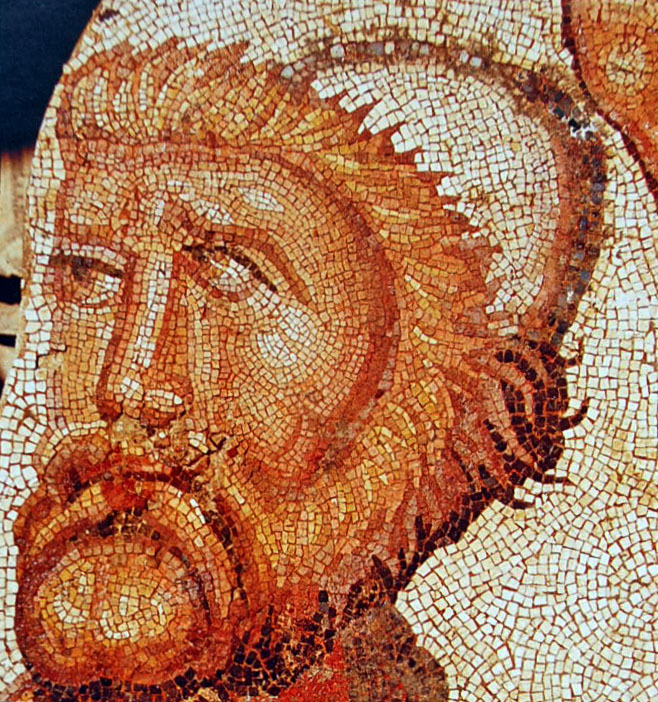
A mosaic depicting Odysseus, from the villa of La Olmeda, Pedrosa de la Vega, Spain, late 4th-5th centuries AD

A mosaic depicting Odysseus, from the villa of La Olmeda, Pedrosa de la Vega, Spain, late 4th-5th centuries AD
( Click image to enlarge)
According to Apollodorus, Paris' brothers Helenus and Deiphobus vied over the hand of Helen. Deiphobus prevailed, and Helenus abandoned Troy for Mt. Ida. Calchas said that Helenus knew the prophecies concerning the fall of Troy, so Odysseus waylaid Helenus. Under coercion, Helenus told the Achaeans that they would win if they retrieved Pelops' bones, persuaded Achilles' son Neoptolemus to fight for them, and stole the Trojan Palladium.
The Greeks retrieved Pelop's bones, and sent Odysseus to retrieve Neoptolemus, who was hiding from the war in King Lycomedes's court in Scyros. Odysseus gave him his father's arms. Eurypylus, son of Telephus, leading, according to Homer, a large force of Kêteioi, or Hittites or Mysians according to Apollodorus, arrived to aid the Trojans. He killed Machaon and Peneleos, but was slain by Neoptolemus.
Disguised as a beggar, Odysseus went to spy inside Troy, but was recognized by Helen. Homesick, Helen plotted with Odysseus. Later, with Helen's help, Odysseus and Diomedes stole the Palladium.
HISTORY
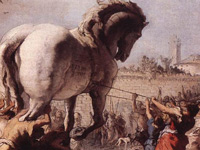
RESOURCES
This article uses material from the Wikipedia article "Trojan War", which is released under the Creative Commons Attribution-Share-Alike License 3.0.
© Stories Preschool. All Rights Reserved.
